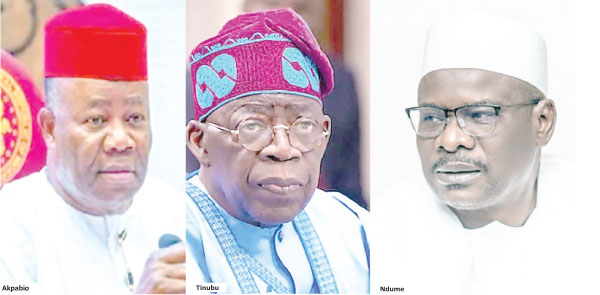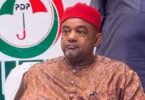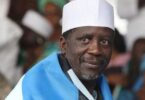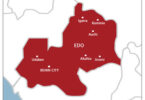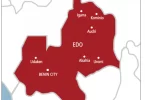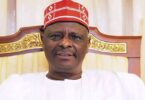In this piece, Abuja Bureau Chief, LEON USIGBE, examines the decision of the APC hierarchy to remove Senator Ali Ndume as the Senate Chief Whip against his virulent criticism of President Bola Tinubu’s style of leadership.
SENATOR Ali Ndume is no stranger to controversy, though he claims his actions are driven by a commitment to justice. Elected as the Minority Leader of the House of Representatives in the 6th Assembly under the All Nigerian Peoples Party (ANPP), Ndume switched allegiance to the ruling Peoples Democratic Party (PDP), citing rampant injustice within the opposition.
In 2015, he became the Senate Majority Leader under the All Progressives Congress (APC) but was impeached in 2017 for opposing the Senate’s decision not to confirm Ibrahim Magu as the chairman of the Economic and Financial Crimes Commission (EFCC). Last week, Ndume was removed from his position as Chief Whip, a continuation of the misfortunes that have plagued his political career since his 2003 election to the National Assembly. This time, his removal resulted from a direct clash with the president.
“We believed in Renewed Hope. But as I said, I speak straight. This government is going down because it is now run by kakistocrats. Kakistocrats is a government run by the worst, least qualified and most unscrupulous citizens,” Ndume remarked in a national television interview. He further accused the government of being run by kleptocrats and alleged that President Bola Tinubu is out of touch with the realities outside the presidential villa.
His criticism of President Tinubu angered his APC colleagues, leading to his removal, based on a complaint from APC National Chairman Umar Ganduje and National Secretary Senator Bashir Ajibola to Senate President Godswill Akpabio. They accused Ndume of making harmful statements against the government that could deter Foreign Direct Investments. They proposed Senator Mohammed Tahir Monguno as his replacement.
Despite his demotion, Ndume has remained defiant, drawing support from political stakeholders who view his removal as an attempt to silence government critics and undermine democracy.
Former Vice-President Atiku Abubakar criticized the National Assembly for enabling executive recklessness by demoting Ndume. Citing the suspension previously meted out on Senator Abdul Ningi for pointing out alleged appropriation inconsistencies, Atiku argued that the legislative arm should protect the people from the authoritarian tendencies of the executive branch.
Atiku, the presidential candidate of the PDP in the 2023 election, stated: “And thus, to make sure that the executive does not go overboard in the application of its powers, the legislative arm of government was conceived as a means of protecting the people from the authoritarian tendencies of wielders of state powers.
“Regrettably, however, the democracy in Nigeria in the current administration of President Bola Tinubu has become an anathema to that general principle of democracy as providing primary protection for the people against executive excesses.
“This ugly tendency is being manifested by the steady posturing of our National Assembly, especially the Senate, of taking a reverse course in its core function and becoming a puppet in the hands of the President.
“It is uncharitable that whenever members of the Senate stand on the floor of the red chamber to perform their statutory duty of calling the executive to order, they are immediately reprimanded for doing so.”
“We are, therefore, beginning to see a pattern in which the National Assembly has become an enabler of executive recklessness, and the concerns of the people stand in the nadir of the priority list of the legislature. This emerging reality must stop. The health of our democracy is being compromised by this unholy alliance between the executive and the legislature and portends a dictatorship that will worsen the lot of the people,” Atiku added.
The Labour Party (LP) also condemned Ndume’s removal, attributing it to his outspoken criticism of the government’s handling of the economy and food scarcity. The LP warned of a gradual descent into dictatorship and called on citizens to defend against the administration’s policies.
“The crime of Senator Ndume was his bold expression of his concerns regarding the escalating cost of living and food scarcity in Nigeria and his revelation that President Bola Tinubu has chosen to play the ostrich even in the face of acute starvation being witnessed in Nigeria.
“The media practitioners are recoiling into their sheds for fear of reporting the facts about this government for fear of emasculation and incarceration. This is a tyranny of a cabal against a legislative autonomy. Nigeria is gradually descending into dictatorship and we are calling on the citizens to be on an alert and put up a defense against the starvation weapon being deployed by this administration,” the LP, said through its national spokesman, Obiora Ifoh.
Former APC National Vice Chairman (North West) Salihu Lukman interpreted Ndume’s removal as an attempt by party leaders to block scrutiny of the president and his actions. Lukman suggested that President Tinubu’s administration is increasingly intolerant of criticism, focusing on retaining power rather than addressing the worsening living conditions in Nigeria.
“It is simply an action taken by party leaders with fanatical mindset of blocking any attempt to scrutinize the president and actions being taken either directly by him or by his representatives, in whatever guise.”
He hinted that President Tinubu’s actions may work against him in 2027. “The way things are, it is almost as if President Tinubu has resolved that he will only be a one term president. Under his watch, the living condition of Nigerians is continuously getting worse. Instead of making effort to develop clear plans to address the situation, the government is becoming more intolerant to criticism,” he added.
Other observers have also linked the growing tension within the APC to the politics of the 2027 elections. Internal dissent is rising as some party members express dissatisfaction with Tinubu’s leadership.
The PDP is positioning itself to benefit from the APC’s perceived failures, leveraging the current economic hardships to gain public support ahead of the next general elections. This strategy was highlighted at a recent meeting of the PDP Governors’ Forum in Enugu, where they promised to restore the economic stability and development achieved during their previous tenure.
“The forum identifies with the Nigerian populace in these troubling times and promises to bring back those good old days, of low inflation rate, affordable food, fuel and transportation, steady FDI inflows resulting in high naira value and the greater quality of human life as recorded.
“In that regard, the meeting commended the governors of PDP-controlled states for their innovative approaches to governance in many fields especially infrastructure, education, health, women and youth initiatives and the timely delivery of developmental projects, across the country,” the PDP Governors’ Forum said in a communiqué issued at the end of the Enugu meeting.
In response, the APC is determined to maintain its dominance in the Nigerian political landscape. APC National Spokesman, Felix Morka, dismissed the PDP’s claims, asserting that the APC is working to correct the issues inherited from the PDP’s 16-year rule. Morka emphasized that the current economic hardships are temporary and will be outweighed by the long-term benefits of President Tinubu’s reforms.
“The enduring dividends of the reforms of President Tinubu’s APC-administration are sure as they are imminent. The transient hardship occasioned by inevitable corrective policies will pale into insignificance in comparison to the enduring prosperity they will bring to all Nigerians,” he declared.
However, as the 2027 elections approach, the Nigerian political arena is set for intense competition as parties vie for the electorate’s favor. The unfolding drama surrounding Senator Ndume is just one chapter in the larger narrative of Nigeria’s evolving political landscape.
READ ALSO: CAN youth wing distances self from planned protest

